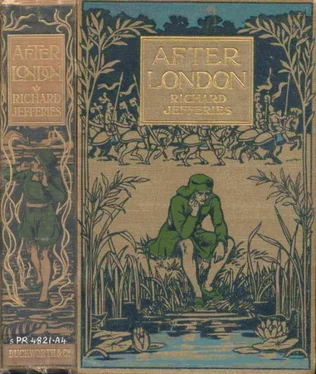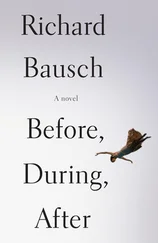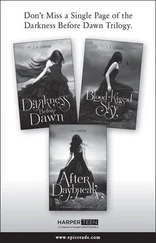Richard Jefferies - After London
Здесь есть возможность читать онлайн «Richard Jefferies - After London» весь текст электронной книги совершенно бесплатно (целиком полную версию без сокращений). В некоторых случаях можно слушать аудио, скачать через торрент в формате fb2 и присутствует краткое содержание. Город: London, Год выпуска: 1905, Издательство: Duckworth & Co., Жанр: sf_postapocalyptic, на английском языке. Описание произведения, (предисловие) а так же отзывы посетителей доступны на портале библиотеки ЛибКат.
- Название:After London
- Автор:
- Издательство:Duckworth & Co.
- Жанр:
- Год:1905
- Город:London
- ISBN:нет данных
- Рейтинг книги:4 / 5. Голосов: 1
-
Избранное:Добавить в избранное
- Отзывы:
-
Ваша оценка:
- 80
- 1
- 2
- 3
- 4
- 5
After London: краткое содержание, описание и аннотация
Предлагаем к чтению аннотацию, описание, краткое содержание или предисловие (зависит от того, что написал сам автор книги «After London»). Если вы не нашли необходимую информацию о книге — напишите в комментариях, мы постараемся отыскать её.
(1885), set in a future in which urban civilization has collapsed after an environmental crisis.” (From
).
This eBook is for the use of anyone anywhere at no cost and with almost no restrictions whatsoever. You may copy it, give it away or re-use it under the terms of the Project Gutenberg License included with this eBook or online at
* * *
After London — читать онлайн бесплатно полную книгу (весь текст) целиком
Ниже представлен текст книги, разбитый по страницам. Система сохранения места последней прочитанной страницы, позволяет с удобством читать онлайн бесплатно книгу «After London», без необходимости каждый раз заново искать на чём Вы остановились. Поставьте закладку, и сможете в любой момент перейти на страницу, на которой закончили чтение.
Интервал:
Закладка:
Oliver’s whole delight was in exercise and sport. The boldest rider, the best swimmer, the best at leaping, at hurling the dart or the heavy hammer, ever ready for tilt or tournament, his whole life was spent with horse, sword, and lance. A year younger than Felix, he was at least ten years physically older. He measured several inches more round the chest; his massive shoulders and immense arms, brown and hairy, his powerful limbs, tower-like neck, and somewhat square jaw were the natural concomitants of enormous physical strength.
All the blood and bone and thew and sinew of the house seemed to have fallen to his share; all the fiery, restless spirit and defiant temper; all the utter recklessness and warrior’s instinct. He stood every inch a man, with dark, curling, short-cut hair, brown cheek and Roman chin, trimmed moustache, brown eye, shaded by long eyelashes and well-marked brows; every inch a natural king of men. That very physical preponderance and animal beauty was perhaps his bane, for his comrades were so many, and his love adventures so innumerable, that they left him no time for serious ambition.
Between the brothers there was the strangest mixture of affection and repulsion. The elder smiled at the excitement and energy of the younger; the younger openly despised the studious habits and solitary life of the elder. In time of real trouble and difficulty they would have been drawn together; as it was, there was little communion; the one went his way, and the other his. There was perhaps rather an inclination to detract from each other’s achievements that to praise them, a species of jealousy or envy without personal dislike, if that can be understood. They were good friends, and yet kept apart.
Oliver made friends of all, and thwacked and banged his enemies into respectful silence. Felix made friends of none, and was equally despised by nominal friends and actual enemies. Oliver was open and jovial; Felix reserved and contemptuous, or sarcastic in manner. His slender frame, too tall for his width, was against him; he could neither lift the weights nor undergo the muscular strain readily borne by Oliver. It was easy to see that Felix, although nominally the eldest, had not yet reached his full development. A light complexion, fair hair and eyes, were also against him; where Oliver made conquests, Felix was unregarded. He laughed, but perhaps his secret pride was hurt.
There was but one thing Felix could do in the way of exercise and sport. He could shoot with the bow in a manner till then entirely unapproached. His arrows fell unerringly in the centre of the target, the swift deer and the hare were struck down with ease, and even the wood-pigeon in full flight. Nothing was safe from those terrible arrows. For this, and this only, his fame had gone forth; and even this was made a source of bitterness to him.
The nobles thought no arms worthy of men of descent but the sword and lance; missile weapons, as the dart and arrow, were the arms of retainers. His degradation was completed when, at a tournament, where he had mingled with the crowd, the Prince sent for him to shoot at the butt, and display his skill among the soldiery, instead of with the knights in the tilting ring. Felix shot, indeed, but shut his eyes that the arrow might go wide, and was jeered at as a failure even in that ignoble competition. Only by an iron self-control did he refrain that day from planting one of the despised shafts in the Prince’s eye.
But when Oliver joked him about his failure, Felix asked him to hang up his breastplate at two hundred yards. He did so, and in an instant a shaft was sent through it. After that Oliver held his peace, and in his heart began to think that the bow was a dangerous weapon.
“So you are late again this morning,” said Oliver, leaning against the recess of the window, and placing his arms on it. The sunshine fell on his curly dark hair, still wet from the river. “Studying last night, I suppose?” turning over the parchment. “Why didn’t you ride into town with me?”
“The water must have been cold this morning?” said Felix, ignoring the question.
“Yes; there was a slight frost, or something like it, very early, and a mist on the surface; but it was splendid in the pool. Why don’t you get up and come? You used to.”
“I can swim,” said Felix laconically, implying that, having learnt the art, it no more tempted him. “You were late last night. I heard you put Night in.”
“We came home in style; it was rather dusky, but Night galloped the Green Miles.”
“Mind she doesn’t put her hoof in a rabbit’s hole, some night.”
“Not that. She can see like a cat. I believe we got over the twelve miles in less than an hour. Sharp work, considering the hills. You don’t inquire for the news.”
“What’s the news to me?”
“Well, there was a quarrel at the palace yesterday afternoon. The Prince told Louis he was a double-faced traitor, and Louis told the Prince he was a suspicious fool. It nearly came to blows, and Louis is banished.”
“For the fiftieth time.”
“This time it is more serious.”
“Don’t believe it. He will be sent for again this morning; cannot you see why?”
“No.”
“If the Prince is really suspicious, he will never send his brother into the country, where he might be resorted to by discontented people. He will keep him close at hand.”
“I wish the quarrelling would cease; it spoils half the fun; one’s obliged to creep about the court and speak in whispers, and you can’t tell whom you are talking to; they may turn on you if you say too much. There is no dancing either. I hate this moody state. I wish they would either dance or fight.”
“Fight! who?”
“Anybody. There’s some more news, but you don’t care.”
“No. I do not.”
“Why don’t you go and live in the woods all by yourself?” said Oliver, in some heat.
Felix laughed.
“Tell me your news. I am listening.”
“The Irish landed at Blacklands the day before yesterday, and burnt Robert’s place; they tried Letburn, but the people there had been warned, and were ready. And there’s an envoy from Sypolis arrived; some think the Assembly has broken up; they were all at daggers drawn. So much for the Holy League.”
“So much for the Holy League,” repeated Felix.
“What are you going to do to-day?” asked Oliver, after awhile.
“I am going down to my canoe,” said Felix.
“I will go with you; the trout are rising. Have you got any hooks?”
“There’s some in the box there, I think; take the tools out.”
Oliver searched among the tools in the open box, all rusty and covered with dust, while Felix finished dressing, put away his parchment, and knotted the thong round his chest. He found some hooks at the bottom, and after breakfast they walked out together, Oliver carrying his rod, and a boar-spear, and Felix a boar-spear also, in addition to a small flag basket with some chisels and gouges.
CHAPTER III
THE STOCKADE
When Oliver and Felix started, they left Philip, the third and youngest of the three brothers, still at breakfast. They turned to the left, on getting out of doors, and again to the left, through the covered passage between the steward’s store and the kitchen. Then crossing the waggon yard, they paused a moment to glance in at the forge, where two men were repairing part of a plough.
Oliver must also look for a moment at his mare, after which they directed their steps to the South Gate. The massive oaken door was open, the bolts having been drawn back at hornblow. There was a guard-room on one side of the gate under the platform in the corner, where there was always supposed to be a watch.
But in times of peace, and when there were no apprehensions of attack, the men whose turn it was to watch there were often called away for a time to assist in some labour going forward, and at that moment were helping to move the woolpacks farther into the warehouse. Still they were close at hand, and had the day watchman or warder, who was now on the roof, blown his horn, would have rushed direct to the gate. Felix did not like this relaxation of discipline. His precise ideas were upset at the absence of the guard; method, organization, and precision, were the characteristics of his mind, and this kind of uncertainty irritated him.
Читать дальшеИнтервал:
Закладка:
Похожие книги на «After London»
Представляем Вашему вниманию похожие книги на «After London» списком для выбора. Мы отобрали схожую по названию и смыслу литературу в надежде предоставить читателям больше вариантов отыскать новые, интересные, ещё непрочитанные произведения.
Обсуждение, отзывы о книге «After London» и просто собственные мнения читателей. Оставьте ваши комментарии, напишите, что Вы думаете о произведении, его смысле или главных героях. Укажите что конкретно понравилось, а что нет, и почему Вы так считаете.












